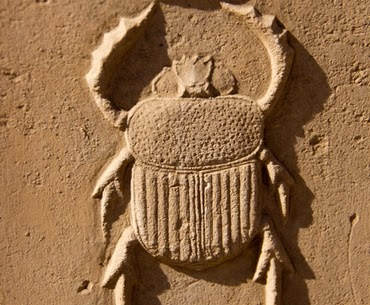
- First sign. Some days ago, I noticed a flower, just one, in a cherry plum in the street. A week later, the cherry plum was completely in blossom. No doubt, spring is here. Meaning, among other things, that it was time to wake up the buggy songs after their hibernation.
- Second sign. The next day I saw a beetle. Small, black, shiny, beautiful (nothing to do with cockroaches, poor little things). And among other bugs, beetles are also waiting for their post.
- Third sign. The very same day, in the afternoon, I read the notes on the writer Josep Maria Espinàs that Toni Soler read during the Golden Medal Awards Ceremony of the Catalonia Government. Towards the end he quotes an excerpt from an article by Espinàs, La sargantana i jo (The small lizard and I). Bugs were asking for coming to a post again:
I thought about mosquitoes, beetles, the pale moths, and I said to myself that among the animals that we usually see, insects are the most rigorously designed. They are admirably symmetrical.
Some time ago, I talked about Детская (Detskaja, The nursery), a cycle of seven songs by Modest Mussorgsky, his own texts describing children scenes. As I mentioned in that first post, the children tell us about their stuff; we, listeners, peep out at their room. Back then, we talked about the second song in the cycle, В углу (V uglu, The corner), where we witnessed the nanny scolding the child for mischief and the child pleading innocent; as him accusing the cat is useless, the grumbling child goes to the naughty step.
Today we're listening to the third song, Жук (Zhuk, The beetle). The child arrives very excited and tells the nanny what happened: he was playing when a beetle turned up, "huge, black and very fat", which scared him. The beetle attacked him and hit him on his forehead; when he was able to react he saw that the bug was quiet. What happened to the beetle? "is it dead or just pretending"? The poor beetle was unlucky and the child doesn't still understand if it is dead or alive... Like the rest of the songs, Mussorgsky reproduces the way children speak. The child arrives and draws the nanny’s attention towards him, then he begins to explain; when the beetle "suddenly" turns up, there is a short piano interlude. The child tells how scared he was and we listen to his fear in the piano until the child hides, then the music slows down; when the kid dares to look what happened and sees his enemy so quiet then his fear becomes curiosity.
A few months ago, I saved an article by Josep Maria Espinàs, Goso parlar de música (I dare to talk about music). He talks about melody, about the twilight of melody, to be more precise, as a keen person on song and jazz. In the last paragraph, he is talking about a concert in a small venue in New Orleans and says:
I also hope that Mr. Espinàs doesn’t mind about sharing this post with a beetle and a naughty boy. Congratulations and my upmost gratitude to Your Excellency, Mr Josep Maria Espinàs.
Njanja, njanjushka!
chto sluchilos', njanja dushen'ka!
Ja igral tam na pesochke,
za besedkoj, gde berjozki,
Stroil domik iz luchinochek klenovykh,
Tekh, chto mne mama, sama mama nashchepala.
Domik uzh sovsem postroil,
Domik s kryshkoj, nastojashchij domik, vdrug!
No samoj kryshke zhuk sidit,
Ogromnyj, chjornyj, tolstuj takoj,
usami shevelit strashno tak,
I prjamo na menja vsjo smotrit!
Ispugalsja ja! A zhuk gudit, zlitsja,
Kryl'ja rastopyril, skhvatit' menja khochet! . . .
I naletel, v visochek menja udaril!
Ja pritailsja, njanjushka,
prisel, bojus' poshevel'nut'sja!
Tol'ko glazok odin chut'-chut' otkryl,
I chto-zhe, poslushaj, njanjushka:
Zhuk lezhit, slozhivshi lapki,
kverkhu nosikom, na spinke,
I uzh ne zlitsja, i usami ne shevelit,
I ne gudit uzh, tol'ko krylyshki drozhat.
Chto-zh, on umer, il' pritvorilsja?
Chto-zh `eto, chto-zhe, skazhi mne, njanja,
S zhukom-to stalos'? Menja udaril, a sam svalilsja!
Chto-zh `eto s nim stalos', s zhukom-to!
Няня, нянюшка!
что случилось, няня душенька!
Я играл там на песочке,
за беседкой, где берёзки,
Строил домик из лучиночек кленовых,
Тех, что мне мама, сама мама нащепала.
Домик уж совсем построил,
Домик с крышкой, настоящий домик, вдруг!
Но самой крышке жук сидит,
Огромный, чёрный, толстуй такой,
усами шевелит страшно так,
И прямо на меня всё смотрит!
Испугался я! А жук гудит, злится,
Крылья растопырил, схватить меня хочет! . . .
И налетел, в височек меня ударил!
Я притаился, нянюшка,
присел, боюсь пошевельнуться!
Только глазок один чуть-чуть открыл,
И что-же, послушай, нянюшка:
Жук лежит, сложивши лапки,
кверху носиком, на спинке,
И уж не злится, и усами не шевелит,
И не гудит уж, только крылышки дрожат.
Что-ж, он умер, иль притворился?
Что-ж это, что-же, скажи мне, няня,
С жуком-то сталось? Меня ударил, а сам свалился!
Что-ж это с ним сталось, с жуком-то!













Comments powered by CComment